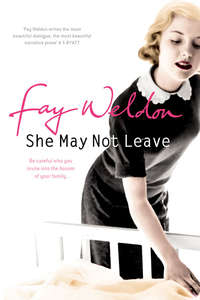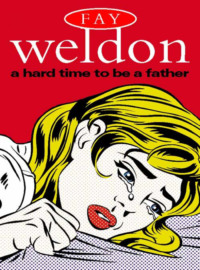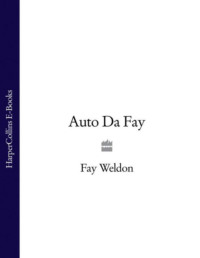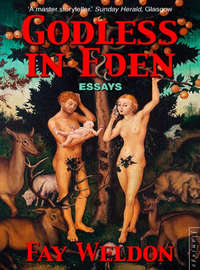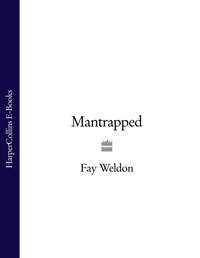
Полная версия
Puffball
‘Look! What are they? Richard!’
Giant puffballs had pushed up out of the ground a yard or so from where they lay. How could she not have noticed them before? Three white globes, giant mushroom balls, each the size and shape of a human skull, thinned in yellowy white, stood blindly sentinel. Liffey was on her feet, shuddering and aghast.
‘They’re only puffballs,’ said Richard. ‘Nature’s bounty.
They come up overnight. What’s the matter with you?’
The matter was that the smooth round swelling of the fungus made Liffey think of a belly swollen by pregnancy, and she said so. Richard found another one, but its growth had been stunted by tangled conch-grass, and its surface was convoluted, brownish and rubbery.
‘This one looks like a brain in some laboratory jar,’ said Richard.
Him and me, thought Liffey, trembling as if aware that the invisible bird of disaster, flying by, had glanced with its wings. Him and me.
Bella and Ray came round from the back of the house.
‘We knew we’d find you round here,’ said Ray. ‘Bella took a bet on it. They’ll be at it again, she said. I think she’s jealous. What have you found?’
‘Puffballs,’ said Richard.
‘Puffballs!’
‘Puffballs!’
Ray and Bella, animated, ran forward to see.
Liffey saw them all of a sudden with cold eyes, in clear sunlight, and knew that they were grotesque. Bella’s lank hair was tightly pulled back, and her nose was bulbous and her long neck was scrawny and her eyes popped as if the dollmaker had failed to press them properly into the mould. Her tired breasts pushed sadly into her white T-shirt: the skin on her arms was coarse and slack. Ray was white in the bright sunlight, pale and puffy and rheumy. He wore jeans and an open shirt as if he were a young man, but he wasn’t. A pendant hung round his neck and nestled in grey, wiry, unhuman hairs. In the city, running across busy streets, jumping in and out of taxis, opening food from the Take Away, they seemed ordinary enough. Put them against a background of growing green, under a clear sky, and you could see how strange they were.
‘You simply have to take the cottage,’ said Bella, ‘if only to bring us puffballs. Have you any idea how rare they are?’
‘What do you do with them?’ asked Liffey.
‘Eat them,’ said Ray. ‘Slice them, grill them, stuff them: they have a wonderful creamy texture—like just ripe Camembert. We’ll do some tonight under the roast beef.’ ‘I don’t like Camembert,’ was all Liffey could think of to say.
Ray bent and plucked one of the puffballs from its base, fingers gently cupping its globe from beneath, careful not to break the taut, stretched skin. He handed it to Bella and picked a second.
Tucker came along the other side of the stream. Cows followed him: black and white Friesians, full bumping bellies swaying from side to side. A dog brought up the rear. It was a quiet, orderly procession.
‘Oh my God,’ said Bella. ‘Cows!’
‘They won’t hurt you,’ said Liffey.
‘Cows kill four people a year in this country,’ said Bella, who always had a statistic to back up a fear.
‘Afternoon,’ said Tucker, amiably across the stream.
‘We’re not on your land?’ enquired Ray.
‘Not mine,’ said Tucker. ‘That’s no one’s you’re on, that’s waiting for an owner.’
He was splashing through the water towards them. ‘You thinking of taking it? Good piece of land, your side of the stream, better than mine this side.’
He was across. He saw the remaining puffball. He drew back his leg and kicked it, and it burst, as if it had been under amazing tension, into myriad pieces which buzzed through the air like a maddened insect crowd, and then settled on the ground and were still.
‘Him or me,’ thought Liffey. But just at the moment Tucker kicked she felt a pain in her middle, so she knew it was her, and was glad, in her nice way, that Richard was saved. Her tummy: his brain. Well, better kicked to death by a farmer than sliced and cooked under roast beef by Bella and Ray.
‘If you want to spread the spores,’ said Ray to Tucker, ‘that’s the best way.’
‘Disgusting things,’ said Tucker. ‘No use for anything except footballs.’
He told them the name of the estate agent who dealt with the property and left, well pleased with himself. His cows munched solemly on, on the other side of the brook, bulky and soft-eyed.
‘I hate cows,’ said Bella.
‘I rather like them,’ said Ray. ‘Plump and female.’
Bella, who was not so much slim as scrawny, took this as an attack, and rightly so.
They drove back to London with Bella’s mouth set like a trap and Ray’s arm muscles sinewy, so tight was his grasp on the steering wheel. Liffey admired the muscles. Richard, though broad and brave, was a soft man; not fat, but unmuscled. Richard’s hands were white and smooth. Tucker’s, she had noticed, were gnarled, rough and grimy, like the earth. A faint sweet smell of puffball filled the car.
Inside Liffey (2)
The pain Liffey felt was nothing to do with Tucker’s kicking of the puffball. It was a mid-cycle pain—the kind of pain quite commonly, if inexplicably, felt by women who take the contraceptive pill. It is not an ovulation pain, for such women do not ovulate. But the pain is felt, nevertheless, and at that time.
Liffey, on this particular September day, was twelve days in to her one-hundred-and-seventy-first menstrual cycle. She had reached the menarche rather later than the average girl, at fifteen years and three months.
Liffey’s mother Madge, worried, had taken her to the doctor when she was fourteen-and-a-half. ‘She isn’t menstruating,’ said Madge, bleakly. Madge was often bleak. ‘Why?’ ‘She’s of slight build,’ the doctor said. ‘And by and large, the lighter the girl, the later the period.’
Liffey, at the time, had no desire whatsoever to start menstruating, and took her mother’s desire that she should as punitive. Liffey, unlike her mother, but like most women, had never cared to think too much about what was going on inside her body. She regarded the inner, pounding, pulsating Liffey with distaste, seeing it as something formless and messy and uncontrollable, and being uncontrollable, better unacknowledged. She would rather think about, and identify wholly with, the outer Liffey. Pale and pretty and nice.
It was not even possible to accept, as it were, a bodily status quo, for her body kept changing. Processes quite unknown to her, and indeed for the most part unnoticeable, had gone on inside Liffey since the age of seven when her ovaries had begun to release the first secretions of oestrogen, and as the contours of her body had begun their change from child to woman, so had vulva, clitoris, vagina, uterus, fallopian tubes and ovaries, unseen and unconsidered, begun their own path to maturity. The onset of menstruation would occur when her body dictated, and not when the doctor, or Madge, or Liffey felt proper.
Her menstrual cycle, once established, was of a steady, almost relentless twenty-eight-day rhythm, which Liffey assumed to be only her right. Other girls were early, or late, or undecided: trickled and flooded and stopped and started. But as the sun went down every twenty-eight days, from the one-hundred-and-eighty-fourth calendar month of her life, Liffey started to bleed. Being able so certainly to predict this gave her at least the illusion of being in control of her body.
Liffey never enquired of anyone as to why she bled, or what use the bleeding served. She knew vaguely it was to do with having babies, and thought of it, if she thought at all, as all her old internal rubbish being cleared away.
The mechanics of her menstrual cycle were indeed ingenious.
Lunar month by lunar month, since she reached the menarche, Liffey’s pituitary gland had pursued its own cycle: secreting first, for a fourteen-day stretch, the hormones which would stimulate the growth of follicles in Liffey’s ovaries. These follicles, some hundred or so cyst-like nodules, in their turn secreted oestrogen, and would all grow until, on the fourteenth day (at any rate in the years she was not taking the pill) the biggest and best would drop off into the outer end of one of Liffey’s fallopian tubes and there, unfertilised, would rupture, allowing its oestrogen to be absorbed. This was the signal for the remaindered follicles to atrophy: and for Liffey’s pituitary to start secreting, for a further twelve days, a hormone which would promote the formation of a corpus luteum which would secrete progresterone and flourish until the twenty-sixth day, when the pituitary withdrew its supplies. Then the corpus luteum would start to degenerate and on the twenty-eighth day be disposed of in the form of menstrual flow—along, of course, with the lining of Liffey’s uterus, hopefully and richly thickened over the previous twenty-eight days to receive a fertilised ovum, but so far, on one-hundred-and-seventy occasions, disappointed.
The disintegration and shedding of the uterus lining, signalled by the withdrawal of oestrogen, would take three days and thereafter the amount of blood lost would gradually diminish as the uterus healed. On this, the twelfth day into Liffey’s cycle, the seventy-seventh follicle in the left fallopian tube was outstripping its fellows, distending the surface of the ovary as a cystic swelling almost half an inch in diameter—but owing to the fact that Liffey had been taking the pill, her body had been hoodwinked so that the ovum would have no time to actually fall, but would merely atrophy along with its fellows.
Did a tremor of disappointment shake Liffey’s body? Did the thwarting of so much organic organisation register on her consciousness? Certainly she had a pain, and certainly Mabs’ eyes flickered as Liffey winced, but that too could be coincidence.
Mothers
Mabs and Tucker walked up to Honeycomb Cottage. They liked to go walking over their land, and that of their neighbours, just to see what was happening. As people in cities turn to plays or films for event, so did Mabs and Tucker turn to the tracks of badgers, or observe the feathers where the fox had been, or the owl; or fret at just how much the summer had dried the stream, or the rain swelled it. A field, which to a stranger is just a field, to those who know it is a battleground for combatant plant and animal life, and the traces of victory and defeat are everywhere.
Tucker came across another puffball and kicked it, taking a run, letting a booted foot fly, entering energetically into the conflict. ‘Nasty unnatural things,’ said Mabs. She remembered her mother before her sister Carol had been born, and the swollen white of her belly as she lifted her skirt and squatted to urinate, as was her custom, in the back garden. Mabs’ mother Mrs Tree thought it was wasteful to let good powerful bodily products vanish down the water closet. This belief was a source of much bitterness and shame to her two daughters, and one of the reasons they married so early.
Mrs Tree was a herbalist, in the old tradition. Her enemies, and she had many, said she was a witch, and even her friends recognised her as a wise woman. On moonlit nights, even now, she would switch off the television and go gathering herbs—mugwort and comfrey, cowslip and henbane, or any of the hundred or more plants she knew by sight and name. She would scrape roots and strip bark, would simmer concoctions of this or that on her gas-stove, at home with distillations and precipitations. The drugs she prepared—as her mother’s before her—were the same as the local doctor had to offer: psychoactive agents, prophylactics, antiseptics, narcotics, hypnotics, anaesthetics and antibiotics. But Mrs Tree’s medicines served, in overdose, not just to restore a normal body chemistry, but to incite to love and hate, violence and passivity, to bring about increased sexual activity or impotence, pain, irritability, skin disease, wasting away, and even death. She made an uneasy mother.
‘Does your mother use puffballs?’ Tucker asked Mabs. Mabs didn’t reply and he knew he should not have asked. She liked to pretend that her mother was just like anyone else. But Tucker, as was only natural in the circumstances, would roll food around in his mouth before he swallowed, searching for strange tastes. Such knowledge passed from mother to daughter.
‘Puffballs are too nasty even for my mum,’ said Mabs, presently. ‘They’re the devil’s eyeballs.’
‘Isn’t it dark and poky!’ said Mabs, pushing open the front door of Honeycomb Cottage. ‘I’d rather have a nice new bungalow any day. But the view’s good, I’ll say that.’
Mabs waved at Glastonbury Tor, in a familiar kind of way, as she went inside. The sun was setting behind the hill, in a blood red sky.
‘I wonder if they’ll live like pigs,’ said Mabs, ‘the way they act like pigs,’ and she looked at Tucker slyly out of the corner of her eye so that he started grunting and waddling like a pig and pushed her with his belly into the corner and bore down upon her, laughing: and they made love in the red light that shone in diamonds through the latticed windows.
‘So she’s too skinny for you, is she,’ said Mabs, presently.
‘Yes,’ said Tucker.
‘You might have to learn to like it,’ said Mabs. ‘Just once or twice.’
‘Why’s that?’ asked Tucker, surprised.
‘It’s important to have a hold,’ said Mabs. ‘You can’t be too careful with neighbours.’
‘You wouldn’t like it,’ said Tucker. ‘Not one bit.’
‘I’m not the jealous type,’ said Mabs. ‘You know that.
Not if there’s something to be got out of it. I don’t mind things done on purpose. It’s things done by accident I don’t like.’
They walked back hand in hand to Cadbury Farm. She was so large and slow, and he was so small and lively, they had to keep their hands locked to stay in pace with one another.
The dogs in the courtyard barked and Tucker kicked them.
‘They’re hungry,’ Mabs protested.
‘A good watchdog is always hungry,’ said Tucker. ‘That’s what makes it good.’
The children were hungry as well, but Mabs reserved her sympathy for the dogs. Mabs had five children. The eldest, Audrey, was fourteen. The youngest, Kevin, was four. Mabs slapped small hands as they crept over the tabletop to steal crusts from the paste sandwiches she prepared for their tea. All her children were thin. Presently Mabs picked up a wooden spoon and used that as a cane, to save her own hand smarting as she slapped. One of the children gave a cry of pain.
‘You shouldn’t have done that,’ said Tucker, taking notice.
‘My children. I do as I please.’ She did, too, according to mood.
‘You’re too hard on them.’
She said nothing.
Her breasts were full and round beneath the old sweater.
Tucker’s eyelids drooped in memory of them.
‘Get the bleeding sauce,’ Mabs shouted at Eddie. Eddie was her third child, and irritated her most, and she slapped and shouted at him more than she did the others. He took after her, being large and slow. She preferred her children to take after Tucker. That cruel audacity which in Mabs was almost attractive, was in Eddie something nasty and sly: she had slapped and startled him too often: he lived in the expectation of sudden disaster, and now cringed in corners. Nobody liked him. He was eight now and it would be the same when he was eighty. Audrey, Mabs’ eldest, looked after him. She was kind where her mother was cruel, and clever at her books. Mabs took her books away because she put on airs.
Mabs and Tucker ate fish fingers and tinned spaghetti. The children made do with the sandwiches.
That night Mabs sat at the window and watched a sudden storm blow up over the Tor. Black clouds streamed out from it, like steam from a kettle, and formed into solid masses at the corners of the sky. Lightning leapt between the clouds. Thunder rumbled and rolled, but the rain did not start.
‘Come to bed,’ said Tucker.
‘There are people in Honeycomb Cottage,’ said Mabs. But Tucker couldn’t see them, although he came to stand beside her. Lightning lit up the interior of the rooms, and made strange shapes which could have been anything.
‘What sort of people?’ he asked, cautiously.
‘Him and her,’ said Mabs. ‘It won’t be long now.’
‘At it again, are they?’
‘No,’ said Mabs. ‘They were in opposite corners of the room. She was holding a baby.’
‘I know what’s the matter with you,’ said Tucker. ‘You want another baby.’
‘No I don’t,’ she said, but he knew she did. Her youngest child was four years old. Mabs liked to be pregnant. Tucker wondered how long it would be before she began to think it was his fault, and what means she would find to punish him. ‘Come to bed,’ he said, ‘and we’ll see what we can do.’
It was a rare thing for him to ask. Usually she was there first, lying in wait, half inviting, half commanding, a channel for forces greater than herself. Come on, quick, again, again! Impregnate, fertilise; by your will, Tucker, which is only partly your will, set the forces of division and multiplication going. Now!
Inside Liffey (3)
Liffey was off the pill.
Liffey’s pituitary gland was once more its own master and stimulated the production of oestrogen and progesterone as it saw fit: no longer, by its inactivity, hoodwinking her body into believing it was pregnant. Liffey became a little thinner: her breasts a little smaller: her temperament a little more volatile. She was conscious of an increase in sexual desire although she was still obliged to pretend, for Richard’s sake, and in the interest of her own self-esteem, to have orgasms. Not that this affected her fertility, for orgasm and ovulation in the human female are not connected, as in other species they sometimes are. And although sexual desire itself can on occasion prompt ovulation, overriding the pituitary’s clockwork timing, the element of surprise which brings this rare phenomenon about (and much distress to rape victims and deflowered virgins) was not present in Richard’s lovemaking with Liffey.
Liffey’s menstrual cycle was thus quickly restored to its normal rhythm. Liffey, all the same, did not become pregnant. Two more lunar months went by. Two more ova dropped, decayed and were disposed of.
Liffey’s chance of becoming pregnant, which was ninety-five per cent when she was a teenager, was by now down by some six per cent and would continue to diminish, slightly, year by year, as would Richard’s, until by the time he was sixty his fertility rate would be down by ninety per cent, and hers, of course, would be nil.
In their favour, both were still young: intercourse occurred at least four times a week, and Richard’s sperms were almost always present in the outer part of Liffey’s fallopian tubes, waiting for ovulation to occur. Against them was the fact that Richard had flu in November, and his sperm count was perhaps temporarily rather low: and Liffey had only just come off the pill. There were the many other statistical probabilities of conception to take into account. Had Liffey known all this, she would perhaps not have lain awake at night, fearing—for although she did not want a baby she certainly did not want to be infertile—that she was barren and that some cosmic punishment had been visited upon her.
It was a matter of time, nothing else, before she conceived.
In-Laws and Secretaries
Liffey’s mother Madge was a lean, hard-drinking, prematurely white-haired teacher of chemistry in a girls’ school in East Anglia. She had never married, nor wished to, and Liffey was not so much a love child as a gesture of defiance to a straitlaced world. Madge had thought to bear a warrior son, but had given birth to Liffey instead, and Liffey had compounded the error by attempting, throughout her childhood, to chirrup and charm her way into Madge’s affections. Madge, hearing that Liffey was trying to have a baby, commented then to a friend, ‘Silence for six months and then this. Not that she’s pregnant, not that she’s miscarried—just that she’s trying to have a baby. How’s that for a piece of non-news?’
‘I expect she thought it would please you,’ said the friend, who was only there for the whisky.
‘It doesn’t,’ said Madge. ‘Liffey is an only child and an only grandchild. Nature is clearly trying to breed the line out. Trust Liffey to interfere with the proper course of things.’
Madge did not want Liffey to be pregnant. She did not want to think of herself diluting down through the generations. She craved mortality.
Richard’s father, on the other hand, living in early retirement in a fisherman’s cottage in Cornwall, was glad to think that his line might well continue, now that Liffey was off the pill. Richard’s mother was made nervous by the news—as if some trouble, pacing for years behind at a steady distance, had suddenly broken into a jog and overtaken her. She started knitting at once, but there was a tenseness in her hands, and the nylon wool cut into her fingers.
The Lee-Foxes looked a placid enough couple—well-heeled, grey-haired, conventional and companionable—but the effort to appear so cost them a good deal in nervous energy. He had ulcers; she, migraines.
‘It’s too early to start knitting,’ said Mr Lee-Fox. ‘She’s not even pregnant: they’re just trying.’
‘Richard always does what he sets out to do,’ said Mrs Lee-Fox, loyally.
‘Your fingers are bleeding,’ said Mr Lee-Fox. ‘Whatever is the matter?’
She wept, for answer.
‘Little garments,’ said Mr Lee-Fox, in wonder, ‘stained by blood and tears!’
Mr Lee-Fox could not understand why, having worked hard to achieve a reasonable home and a happy life and done so at last, troubles should still keep occurring. It was his wife’s fault, he concluded. She was discontented by nature. He hoped, for his son Richard’s sake, that Liffey was not the same.
‘You mustn’t worry,’ he said. ‘Liffey will come through with flying colours. Wait and see.’
Liffey was at the time extremely discontented, which made her more loving and lively than ever. Chirruping and charming. Sometimes, when she woke up in the apartment, opening her eyes to the concrete wall of the house next door, and the sound of traffic instead of the sound of birds, she thought she was a child again, and in her mother’s house.
The trouble was that Richard, telephoning Dick Hubbard the estate agent about Honeycomb Cottage, had been told that the cottage was for sale, and not to rent, and Richard had said they could not afford it.
‘We could spend some of my money,’ said Liffey. ‘No, we couldn’t,’ said Richard firmly. ‘I’m not going to live off you. What kind of man would that make me?’
By mutual consent, throughout their marriage, Liffey’s money had been used to buy small things, not large things. Confectionery as it were, but not the matrimonial home.
‘Then let’s sell this place and buy that.’
‘No. It isn’t ours to sell.’
The apartment had been a wedding gift from Mr and Mrs Lee-Fox. Disapproving of Liffey as a bride for Richard, they had sacrificed their own comfort and security and spent an inordinate amount on the present. Thus they hoped both to disguise their feelings and remain securely sealed in the ranks of the happy and blessed.
When Richard came home from his boarding school bruised and stunned, victim of bullying, they would seem not to notice.
‘Such a wonderful school,’ they’d say to friends. ‘He’s so happy there.’
Liffey searched the newspapers for cottages to rent but found nothing. Another month passed: another egg dropped, and failed. Liffey bled; Richard frowned, perplexed.
Liffey took a temporary job in a solicitor’s office. The quality of her cooking deteriorated. She served Richard burnt food and tossed and turned all night, keeping him awake. She did not know she did it, but do it she did. She had come off the pill, after all, and still they lived in London.




